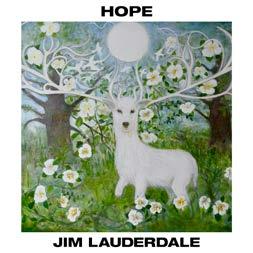
3 minute read
"Hope" new album by Jim Lauderdale
Singer, songwriter, guitarist, and bon vivant Jim Lauderdale is an effortlessly enigmatic musical force of nature.

Jim Lauderdale
Photo by Scott Simontacchi
Singer, songwriter, guitarist, and bon vivant Jim Lauderdale is an effortlessly enigmatic musical force of nature whose career is defined by a multitude of twists and turns only he could have pulled off. In addition to his many cuts by other artists, his catalog of 34 albums includes collaborations with Ralph Stanley, Buddy Miller, and many more. His prolific output is only matched by the authenticity of his approach to each project. Produced with longtime collaborator, bassist and AFM 257 member Jay Weaver, Lauderdale’s latest album, the appropriately titled Hope, is a beautifully crafted message of positivity and encouragement that works on a number of levels and bears repeated listening.
Hope begins with “The Opportunity to Help Somebody Through it,” an uplifting sentiment that sets the lyrical tone for the whole album, perfectly complimented by the edgy guitar of Chris Scruggs, Jim Hoke’s shimmering electric piano, and a stomping R&B groove. “Sister Horizon” has a ‘70s Byrds/ Neil Young swaying acoustic vibe and the sweet sentiment is echoed perfectly by Kenny Vaughn’s guitar work.
“The Brighter Side of Lonely” is a song of empathy with a positive outcome waiting on the other side of the journey. Russ Pahl’s soulful electric guitar fills dance with Lauderdale’s sincere vocal and the shimmering vocals of Frank and Lillie Mae Rische, who are featured on BGVs for most of the album. There is a similar message of redemption in “Mushrooms are Growing After the Rain,” a most unusual lyrical metaphor, but one that makes perfect sense for this journey of life we all go through in our own way.
“Memory” is an elegant tribute to those gone before us, expressing gratitude for lessons learned, with an emotional yet calm vocal from Lauderdale. On the intensely intimate “Breathe Real Slow,” the ghost of Guy Clark hovers in the background as Lauderdale speaks and sings from the heart about the need to slow down and experience the moment you are in, something of which we all need a reminder.
Midway through, the album takes a bit of a turn, with a trio of tunes leaning towards a ‘60s psychedelic-ish feel. “Don’t You Dream Anymore” and “We Fade In, We Fade Out” echo the late-period Beatles sound, with a timeless message of keeping yourself open to wherever life takes you. The gentle guitar-driven “It’s Almost More Than All the Joy” completes the trilogy, and Weaver’s bass drives those tracks in a McCartney-esque way.
Next, the album heads to New Orleans with “Here’s to Hoping.” Hoke’s clarinet, flute and saxes trade licks with Scruggs’ funky electric guitar over a second line groove. The lyric directly addresses the pandemic and everyone’s need to find their own way to coping and coming out of hiding, and the timing of this positive message couldn’t be more appropriate. “When Searching For Answers” summons up a classic ‘60s Muscle Shoals R&B ballad-feel that unexpectedly goes into a swing vibe before an ending that leaves the listener wanting more. Appropriately, the album closes with “Joyful Noise,” a gospel rave-up, with piano, drums and especially Weaver’s driving bass pushing the band, while bluegrass-tinged background vocals ride high over the driving rhythms.
Listening to this album as a whole is highly recommended. The songs flow from one to another seamlessly. Not just musically, but also in the positive lyrical message of encouragement that constantly evolves throughout the record, tying it all together. We need to be not only aware of ourselves, but how we fit into the world. With Hope, Jim Lauderdale offers just the right perspective and message, and it couldn’t be more appropriate for these times. — Roy Montana





